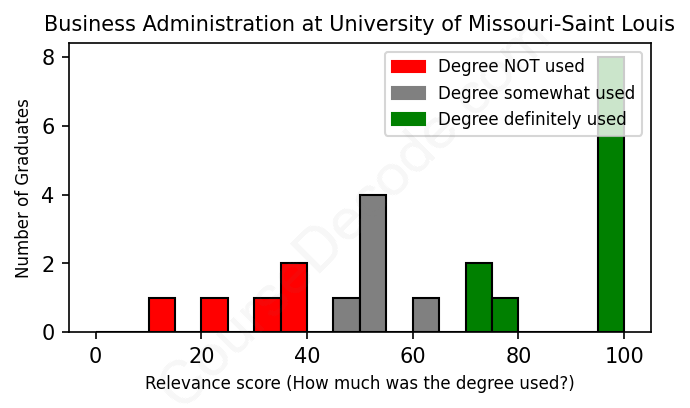
First, some facts. Of the Business Administration graduates from University of Missouri-Saint Louis we've analyzed , here's how many have used (or NOT used) their degree in their career:

These are estimates based on AI analysis of 22 LinkedIn profiles (see below).
The verdict? Slightly below average. Overall, with an average relevance score of 66%, Business Administration graduates from University of Missouri-Saint Louis have a slightly lower likelihood (-1%) of finding work in this field compared to the average graduate across all fields:
And for comparison, here's the chart for all profiles we've looked at across all degrees.
Also, after graduating, only 18% of these graduates have pursued further education other than another Bachelor's degree (such as a Masters degree or other), compared to the average across all profiles of 35%. This suggests a Bachelors degree is enough for most Business Administration graduates, and it's normal to look for work straight after graduation.
See the details:
|
Relevance score: 100% We think this person has gone into a career highly relevant to their degree. We think this person has gone into a career highly relevant to their degree.
DEGREE INFOGraduated in 2010 from University of Missouri-Saint Louis with a Bachelor's degree in Business Administration. No other secondary education since. JOB HISTORY SINCE GRADUATIONChief Operating Officer SSA Jan 2016 - Oct 2017 Company Owner  RC Direct LLC Aug 2016 - Oct 2017 Chief Executive Officer  AAP Feb 2018 - Present ABOUTNo information provided. |
The top 10 most common jobs done by the graduates we've analyzed (ranked most common to least) are:
When checking out the jobs held by graduates of the Business Administration program from the University of Missouri-Saint Louis, it seems like a fair share of them found roles in corporate settings, especially at companies like Boeing and financial institutions like U.S. Bank. A lot of these positions, like Business Development Specialist or Universal Banker, require skills directly linked to their studies, such as strategies in business management, customer relations, and finance. Many of these jobs let graduates apply their classroom knowledge in real-world ways, which is pretty awesome. And then you have roles like Chief Operating Officer and CEO, where having a strong business acumen is crucial. Generally, jobs that dealt with business development, project management, or financial analysis were more common and highly relevant to their degree.
However, not every job path taken by these graduates had a strong connection to Business Administration. Some ended up in positions more focused on technical skills or specific job functions, like being a photographer or a technician, which don’t really pull from the broader business knowledge they gained. There were also roles like Data Entry Technician or Claims Assistant that seemed more administrative than strategic. So, while many graduates clearly found their way into jobs that made great use of their degree, others might not have landed directly in the heart of Business Administration-related fields. Overall, it looks like there’s a good mix of relevant and less relevant roles when it comes to how these grads are putting their education to use in the workforce.
Here is a visual representation of the most common words in job titles for Business Administration graduates (this is across all Business Administration graduates we've analyzed, not just those who went to University of Missouri-Saint Louis):

Graduates from the University of Missouri-Saint Louis who studied Business Administration tend to have diverse career trajectories, with some finding themselves in solid roles directly related to their degree, while others explore more varied paths. For many, the first job right out of college often lands them in entry-level positions that are a mix of administrative, operational, and customer service roles. Positions like Universal Banker or Data Entry Technician seem to be popular starting points, helping recent grads gain crucial experience in the business world. However, it's interesting to note that some individuals quickly pivot to roles that might be less conventional, like photography or owning small businesses. This suggests that while some graduates stick to corporate paths, others might chase personal passions or entrepreneurial ventures instead.
As we look five to ten years down the line, there's a noticeable trend where many alumni take on management roles or specialized positions within their fields. The trajectory can vary widely — some will climb the corporate ladder at major companies like Boeing, while others might establish their own businesses or work in completely different industries, like surrogacy or property management. The key takeaway is that although there is a mixture of success stories and less conventional careers, it appears that a significant number of graduates are managing to carve out their niches. Overall, for those who leveraged their Business Administration education effectively, the career outlook seems quite optimistic with plenty of room for growth and diversification.
Honestly, getting a Bachelor’s degree in Business Administration at the University of Missouri-Saint Louis is about average in terms of difficulty. It has its challenging moments, like any degree—you’ll definitely have to get comfortable with things like accounting, economics, and maybe some statistics, which can be tricky for some people. But on the flip side, the program is designed to be manageable, with lots of resources available like professors who are willing to help and study groups that can make a big difference. So, while it’s no walk in the park, if you stay organized and keep up with the work, you should be able to handle it just fine!
Most commonly, in the LinkedIn profiles we've looked at, it takes people 3 years to finish a Bachelor degree in Business Administration.
So, when looking at the job history of these University of Missouri-Saint Louis grads, it really seems like there’s a mixed bag when it comes to their earnings. Take the grads from 2010, for example—one's been climbing the ladder at Boeing for over a decade, which likely means they're making a pretty good salary now. On the flip side, some others took on roles that might not pay as well, like a photographer or a social media intern, which usually don’t offer high salaries. Then there are those working in operations and management roles in bigger companies like Amazon, who are probably pulling in decent pay too. Overall, it seems like some of them are definitely making decent money, especially those in managerial positions or at large companies, while others might still be figuring things out and not making as much.
Here is a visual representation of the most common words seen in the "about" section of LinkedIn profiles who have a Bachelor degree in Business Administration (this is across all Business Administration graduates we've analyzed, not just those who went to University of Missouri-Saint Louis). This may or may not be useful:

Here are all colleges offering a Bachelor degree in Business Administration (ordered by the average relevance score of their Business Administration graduates, best to worst) where we have analyzed at least 10 of their graduates: